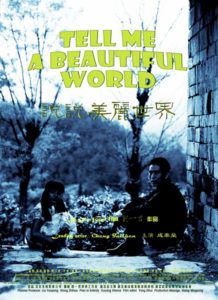Tell Me a Beautiful World
说说美丽世界
China, 2013, colour, 2.35:1, 106 mins.
Director: Liu Yijun 刘一君.
Rating: 7/10.
Beguilingly simple story of a blind man and his young daughter avoids melodrama.
Sichuan province, southern China, the present day. Following the death of his mother (Liu Huiyi), the blind Luo Guangming (Cheng Taishen) moves with his 11-year-old daughter Luo Shuoshuo (Zhu Jia’ni) from the countryside to the town so she can attend school and enjoy the chances in life he never had. He works as a shoeshine on the street, with Luo Shuoshuo, who is his eyes on the world, helping him. Luo Guangming remembers his younger days as blindness started to encroach on him and he was no longer able to work in the fields; his elder, crippled brother Luo Guanghui (Liu Yi), who finally got married; his own attempt to find a girlfriend (Huang Yihan) who wouldn’t be put off by his growing blindness; and how both his mother and brother helped care for Luo Shuoshuo when she was younger. Luo Shuoshuo, who was born with a hare lip, repeatedly asks questions about her mother she never knew, but Luo Guangming and his brother evade them.
REVIEW
A film of beguiling simplicity that’s all the more affecting for its lack of melodrama, Tell Me a Beautiful World 说说美丽世界 has a discreet poetry that sets its apart from the sizable number of Mainland movies dealing with physical impairment. Centred on the relationship between a blind man and his 11-year-old daughter who becomes his “eyes on the world”, the film has no conventional narrative, instead presenting the audience with a series of scenes from the life of the two main characters and their family, in no particular chronological order. Initially a little confusing, but soon making sense as the larger picture emerges, it’s a story with a positive message of triumph over adversity that’s not at all hectoring or cliched.
Forty-four-year-old writer-director Liu Yijun 刘一君 (real name: Liu Junyi 刘君一) has worked in both TV drama and films, generally focused on young people – from the political potboiler about young model hero Lei Feng, Youthful Days 青春雷锋 (2013), to more personal films like One Million Yuan 一百万 (2004), Going Home 父子返乡 (2010) and Times Without a Dream 疼痛难忍 无梦之年 (2007). Beautiful World expresses most clearly his background as a poet, following middle-aged Luo Guangming as he leaves behind his mother and elder brother and goes down to the city with his daughter Luo Shuoshuo to put her through school and give her the chances in life he never had. As Luo Guangming works as a blind shoeshine on the streets, Luo Shuoshuo describes the world around him and also does some growing-up of her own, gaining in self-confidence after being born with a hare-lip that scarred her youth.
On paper the film sounds sentimental, but Liu never lets it become so, cross-cutting back to Luo Guangming’s earlier life (as blindness slowly encroaches on him, and he seems doomed never to find a wife) and also the younger years of Luo Shuoshuo (as his mother and crippled elder brother all pitch in to help raise her). The thread which binds together the various short scenes, both past and present, is the mystery of who Luo Shuoshuo’s mother was: the girl herself says “I have no mother” and the whole family spins stories in answer to her questions. The movie feels a little long during its final 20 minutes or so, but not distractingly.
Performances are earthy and realistic, and there’s excellent chemistry between the young Zhu Jia’ni 朱佳妮 (A Girl’s Story 守候的心, 2013) as Luo Shuoshuo and the elder Cheng Taishen 成泰燊 as Luo Guangming, especially in the city scenes. Usually seen in supporting roles (as a cop in Drug War 毒战, 2012), but capable of much more (as the titular ex-husband in the black comedy Ma Wen’s Battle 马文的战争, 2010), Cheng, now in his mid-40s, plays the father quietly but without any self-pity. As the elder, more angry brother, Liu Yi 刘毅 is believable, while Liu Huiyi 刘惠仪, a Chengdu theatre actress, grounds the film as the aged mother who gave birth to the two impaired, frustrated men.
Though it’s not important to the story (which has a timeless quality), the exact location is never specified. The film was shot in spring 2012 in the Wudang mountains, northwestern Hubei province, but most of the cast speak in Sichuanese dialect, which gives the movie a specially emotive quality of its own. The sound effects track is especially notable for its contrast between country and city scenes, adding extra atmosphere to the natural widescreen photography by d.p. Hai Tao 海涛. The film’s Chinese title can mean either “Tell Me a Beautiful World” or “Shuoshuo’s Beautiful World”, playing on the double meaning of shuōshuō 说说.
CREDITS
Presented by Beijing Guangcheng Pictures (CN). Produced by Beijing Guangcheng Pictures (CN), Director Liu Yijun Film Studio (CN), Hubei Provincial Federation of Literary & Art Circles (CN), Tongshan County Government (CN).
Script: Liu Yijun. Photography: Hai Tao. Editing: Yang Zihui. Art direction: Wang Haiyuan. Sound: Zhang Chuanwei.
Cast: Cheng Taishen (Luo Guangming), Zhu Jia’ni (Luo Shuoshuo, his daughter), Liu Huiyi (Daxiu, Luo Guangming’s mother), Liu Yi (Luo Guanghui, Luo Guangming’s elder brother), Chen Zhenghua (Luo Guangming’s father), Huang Yihan (Huang Li, Luo Guangming’s potential girlfriend), Le Kaihong (Xue, teacher), Li Jing’er (young Luo Shuoshuo), Liao Fuxue (baby Luo Shuoshuo), Zhang Qin (Xiaoxiao).
Release: China, 14 Apr 2013.
(Review originally published on Film Business Asia, 19 Jun 2014.)
